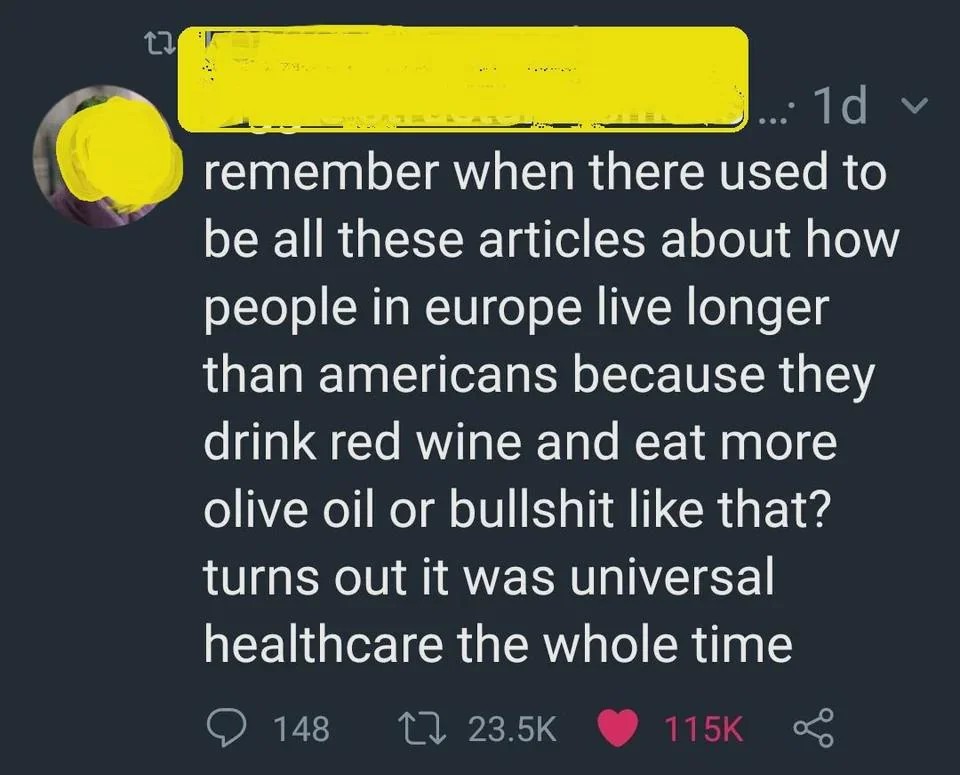this post was submitted on 07 Feb 2024
1544 points (98.3% liked)
Microblog Memes
5467 readers
2 users here now
A place to share screenshots of Microblog posts, whether from Mastodon, tumblr, ~~Twitter~~ X, KBin, Threads or elsewhere.
Created as an evolution of White People Twitter and other tweet-capture subreddits.
Rules:
- Please put at least one word relevant to the post in the post title.
- Be nice.
- No advertising, brand promotion or guerilla marketing.
- Posters are encouraged to link to the toot or tweet etc in the description of posts.
Related communities:
founded 1 year ago
MODERATORS
you are viewing a single comment's thread
view the rest of the comments
view the rest of the comments

I found 85 studies (in a meta analysis) that link them here. If you disagree, you can just say so though, you don’t need to hide it in a question. I would have given you a source the first time if I knew it was more than just curiosity.
Salt research is a mess: https://www.ncbi.nlm.nih.gov/pmc/articles/PMC9174123/
Those on a high sodium diet are generally on a high processed food diet, and that's pretty unhealthy by itself
Those on low salt are generally on a whole food diet which is healthier (kale has little salt, salmon has little salt)
The people on the processed food are also probably poorer, which is independently a factor in poor health
It is a mess and those confounding factors do muddy things to a degree. That’s the benefit in a meta analysis, but of course if you put garbage data in, you get garbage data out.
The study you posted is brutal about studies that suggest that salt is not bad for you. It’s a pretty aggressive call out of industry sponsored “scientists” who publish ill-supported findings suggesting salt isn’t bad for people. I deliberately tried to find a less incendiary link, so as not to put you on the defensive. I’m not sure what you’re saying with it, but this now feels more like the Socratic method to me.
I think I am arguing that though people talk as if salt is a settled issue it really isn't
I don't think one can say anything about the safety of salt other than that some is needed, too much is bad.
I feel like salt should be easy since it tastes good until a point, then it tastes terrible, which suggests our bodies know how much we need, but for some reason there are monied interests trying to find proof that all salt is bad, competing with others trying to find how much is safe, how much is needed
That study suggests salt is a settled issue and claims the only financial interests are food companies trying to make salt more acceptable. I don’t think it’s very good evidence for your argument.
Who would financially benefit from the salt recommendations being artificially low?
That's the issue I have. I think it can only be reputation and closely held beliefs
And likewise for high salt, there's not much benefit in that position
Well, with an artificially inflated RDA for salt, food companies can use more salt in their products without being labeled “unhealthy.” Salt, as a flavor enhancer and food preservative that stimulates thirst, makes food taste better, last longer, and potentially increases drink sales, all of which are profitable for food manufacturers and sellers. Going further, the medical system benefits from salt levels that are too low or too high, but much more from high levels, as that involves a longer treatment plan.
What do you mean by reputation and belief?